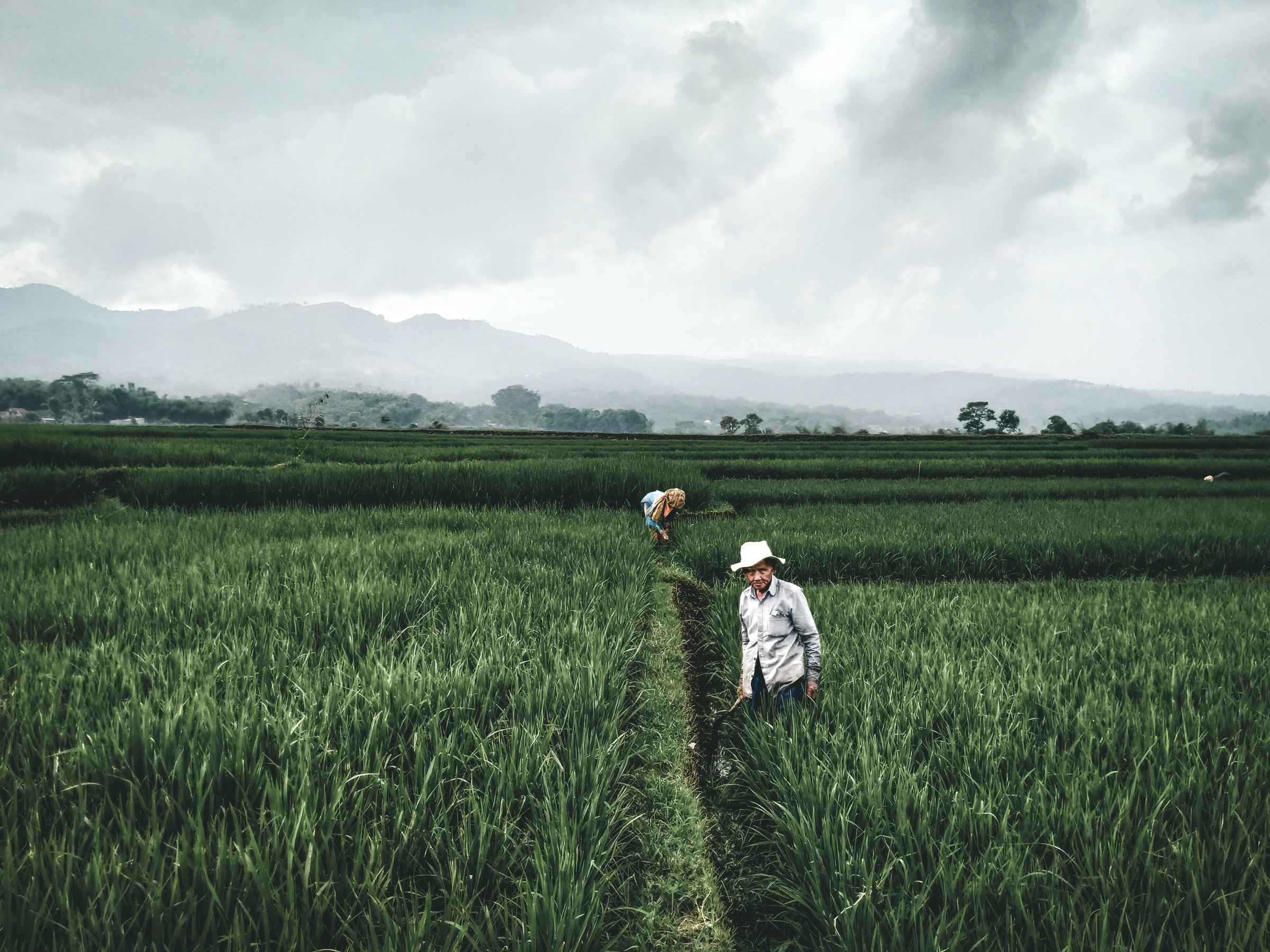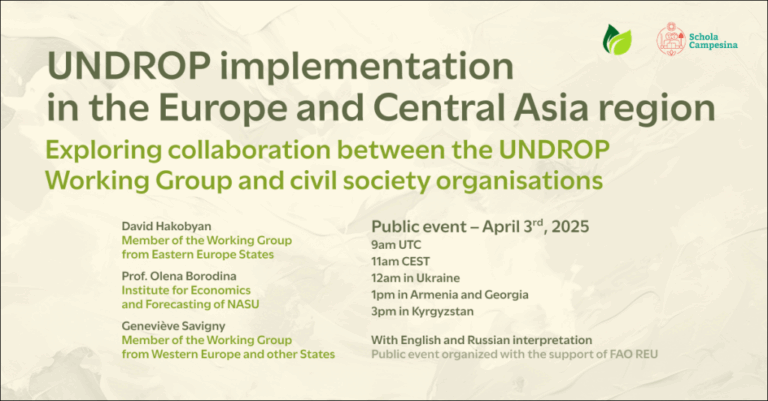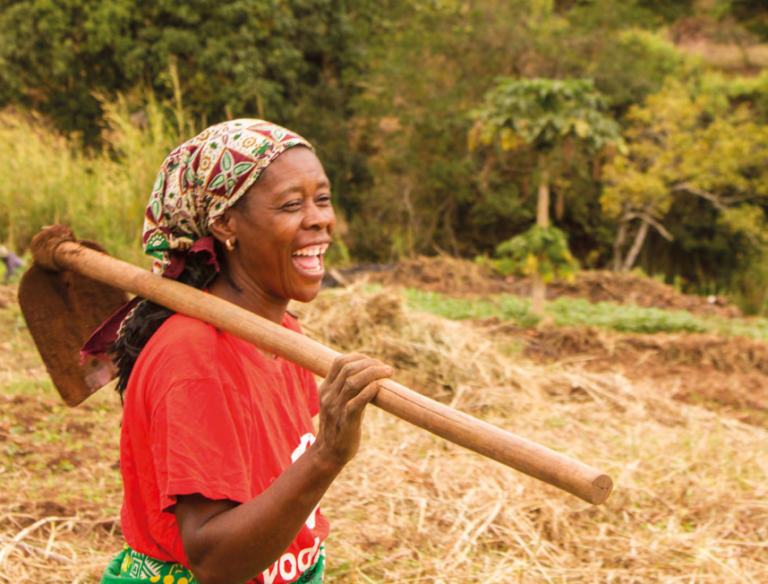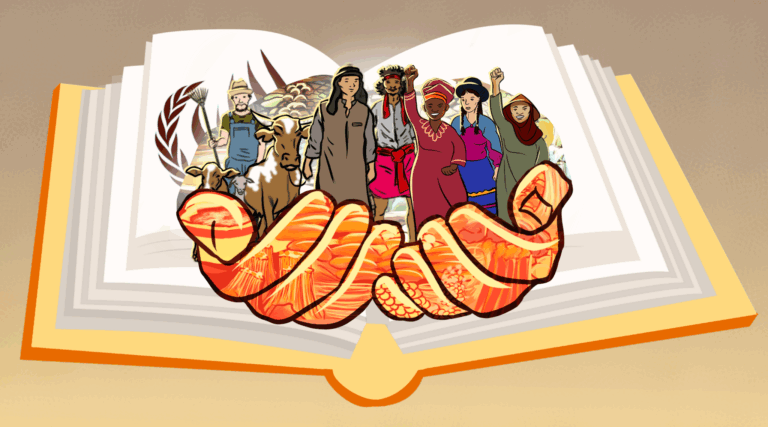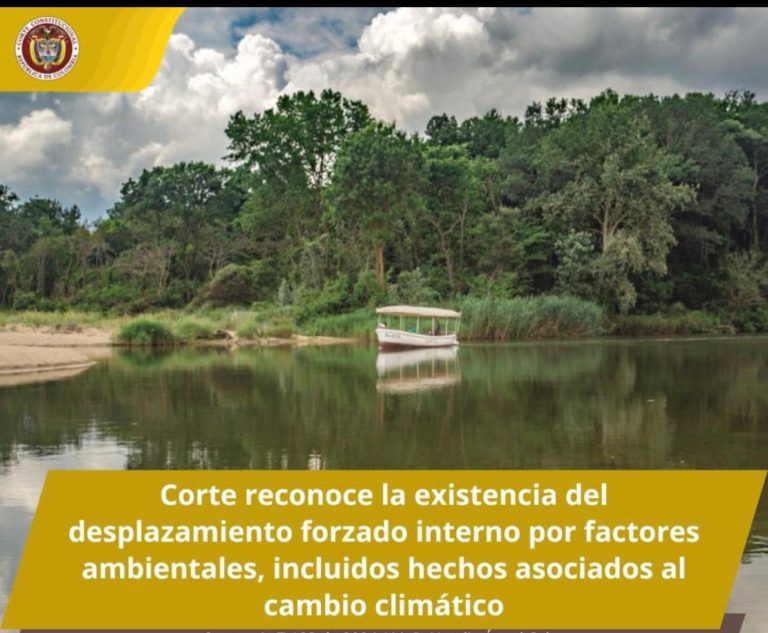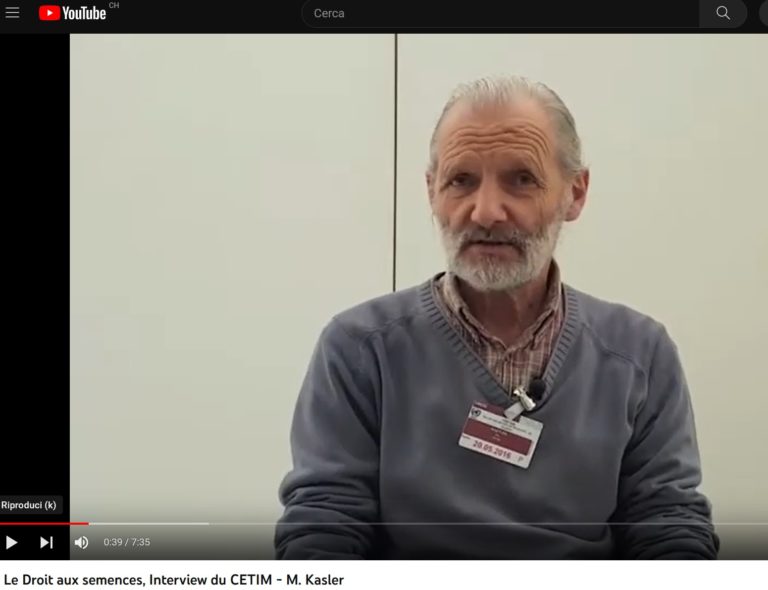The Rights of Peasants: A juridical and political lever to challenge the power of transnational corporations
This article was originally published on the Rosa Luxemburg Foundation’s website on April 13, 2022. You can find it again HERE.
Agriculture, and more generally, food production, has been mankind’s principal activity since its very first settlements. Under the pretence of feeding mankind, from the nineteenth century onwards, this activity has become industrialised (through mechanisation, the ‘green revolution’, the intensive use of chemicals and digitalisation), which allowed, at least initially, increases in production.
Over time however, the process of industrialisation not only failed in its claim to be able to feed the world’s population, but has also had harmful effects in environmental, social, health, economic and cultural terms. Today, the sector is dominated by agri-food transnational corporations (TNCs), guided solely by the desire to maximise their profits in the shortest possible time.
This mode of production, supported by state subsidies and a favourable legal framework, has, in just a few decades, strengthened the TNC’s control over the agri-food sector. This dominance has been exercised, in particular, via the agri-food policies of the European Union and the United States, which in turn have placed severe pressure on peasants around the world. At the same time, a very large number of states, themselves often subject to structural adjustment programmes and threatened with exclusion from the world market, have not only reduced or eliminated all state support for peasants, but also abandoned all regulations of the related markets for food (price controls, customs duties, etc.), so strengthening further the monopoly of TNCs over the food chain.
One result of these dominant agri-food policies, among other things, is that rural populations are prevented from living off their labour. With no control over the production process or the marketing of their produce, every year tens of millions of peasants and other rural workers are forced to leave agricultural areas, often ending up crowded into slums and/or having to leave their country to survive as migrant workers. Among the most sinister aspects of these policies is the worrying increase in hunger and malnutrition among lower socio-economic groups, the decline in food’s inherent nutritional qualities, the reduction in biodiversity, desertification, the shrinking quantity of arable land, large-scale expropriation and land-grabbing, and stock market speculation on food products, to name but a few.
The rights of peasants
Faced with this unsustainable situation which is threatening the very existence of farming, La Vía Campesina, an umbrella organisation of peasants, initiated a campaign for the defence and recognition of the rights of peasants. Which has indeed, met with success. Finally, in 2018, following a long process, the UN General Assembly adopted by a large majority the Declaration on the Rights of Peasants and Other People Working in Rural Areas[1]. So what does it contain?
Consisting of 28 articles and containing innovative rights (rights to land, seeds, means of production, etc.), this Declaration establishes the rights of peasants and other people working in rural areas within the framework of international human rights regulations. Its scope is inclusive as, in addition to peasantry, it also applies to small-scale fishermen, nomads, rural indigenous peoples and agricultural workers. It also establishes civil, political, economic, social and cultural rights, based on the needs of peasants, as well as obligations on governments for its practical implementation. Moreover, the Declaration emphasises the right of peasants to freely and actively participate in decision-making, as well as their right to seek, receive, produce and disseminate information concerning them.
This Declaration is a project which originated from within peasant communities[2] as a safeguard against violations of their rights and an economic system which deprives them of their livelihoods for the benefit of agri-food TNCs.
Therefore, it recognises the direct relationship between the Declaration on the Rights of Peasants and the problems caused by the activities of TNCs. Moreover, Article 2.5 of the Declaration requires governments to apply measures in respect of those entities:
“States shall take all necessary measures to ensure that the non-State actors that they are in a position to regulate, such as private individuals and organizations, and transnational corporations and other business enterprises, respect and strengthen the rights of peasants and other people working in rural areas.”
In this article, we will focus on three particularly harmful aspects of the agri-food industry for peasants: seeds, land and the marketing of food products.
Agri-food TNCs vs. peasant seeds
Among the negative consequences of the monopoly of agri-food TNCs on the food chain is the issue of industrial seeds. Currently, four agri-food TNCs are in control of the global seed market[3], so contributing significantly to biodiversity loss. As well as imposing their selections and prices, these TNCs’ control is extended due to the fact that public authorities will often subsidise their seeds and even make them ‘mandatory’ for peasants. The latter therefore become dependent on the supplies (fertilisers, pesticides, etc.) to which they are bound[4].
Furthermore, these practices are protected by binding laws at the national level, as well as international agreements on intellectual property rights[5]. In other words, this right is corrupted and put at the service of TNCs in order, among other things, to privatise and commoditise living[6]. It is important to highlight how this corruption is not restricted to food products but extends to other areas, such as health[7].
Nevertheless, the seeds used in agriculture are the result of selection and exchanges between peasants, the product of centuries-old expertise handed down from generation to generation. This essential role on the part of peasants is hindered by the imposition of standardised industrial seeds[8], especially when the latter is protected by a strict legal framework involving sanctions. It is now widely accepted that the loss of biodiversity and the standardisation of seeds are not only harmful to the environment, but also to health, due to the nutrient depletion resulting from industrial agriculture. Furthermore, this loss of biodiversity is threatening food security, due to the standardisation of varieties and their increased vulnerability on a large scale.
Seed companies have gone even further in exploiting intellectual property rights, by digitalising and patenting ‘genetic resources’, i.e. all living things (plants, animals, micro-organisms, etc.). Today, millions of genetic sequences are patented. By controlling these sequences, if only in part, TNCs are not only undermining biodiversity, but are also hindering small-scale production (agriculture, fishing, livestock, etc.), depriving producers of their right to use certain plant varieties, which are now subject to ownership as a result of these processes.
How does the Declaration on the Rights of Peasants tackle the problems arising from the actions of agri-food TNCs with respect to the right to seeds? Article 19 of the Declaration establishes the right to seeds and guarantees peasants the right to develop, preserve, use, protect, exchange and sell their seeds, and to reject seeds which are not suitable to their needs and environment:
“(a) The right to the protection of traditional knowledge relevant to plant genetic resources for food and agriculture; (b) The right to equitably participate in sharing the benefits arising from the utilization of plant genetic resources for food and agriculture; (c) The right to participate in the making of decisions on matters relating to the conservation and sustainable use of plant genetic resources for food and agriculture; (d) The right to save, use, exchange and sell their farm-saved seed or propagating material.” (Art. 19.1)
This right can be regarded as having two functions: (re)providing peasants with control over their seeds and ensuring that they are part of the decision-making in relation to this matter. In other words, this right allows peasants to strengthen their independence from TNCs; such independence being essential in order to be able to live in dignity and feed mankind with healthy food. According to Article 19, governments have the obligation to take adequate measures to support peasants in this quest for independence:
“States shall take measures to respect, protect and fulfil the right to seeds of peasants and other people working in rural areas. (…) States shall take appropriate measures to support peasant seed systems, and promote the use of peasant seeds and agrobiodiversity.”(Art. 19.1.3 and 19.1.6)
TNCs ‘ignore’ social aspects linked to land
Matters related to land, agriculture and other activities in rural areas are crucial, even vital, and well beyond the scope of a mere ‘economic tool’; indeed, they relate to culture, social ties and the identity of the peoples living there. In fact, the policies and regulations adopted in this field, at both the national and the international level, as well as in related areas (food production systems, water and forest management, mining, mega-projects, trade and investment agreements, etc.) have a decisive impact on economic, social, cultural and environmental development and consequently, on the enjoyment of all human rights. They also have a major impact on the management and use of land, mainly of land that is fertile.
This means that access to land, water sources, forests and pastures is one of the greatest challenges faced by peasants and other rural populations (fishermen, nomads, indigenous peoples, etc.). The latter have often been deprived of meaningful agrarian reforms and their access to land and other natural resources is increasingly hindered. Indeed, agri-food TNCs are seizing arable land to devote it to certain intensive commercially profitable crops, to livestock farming or simply due to mere speculation, when it is not removed from agriculture altogether.
Beyond its economic function, land grabbing must be approached from an intrinsically political perspective, as at stake is the power of the peoples and communities concerned to decide how and for what purposes land and other natural resources should be used. This issue must be considered with reference to the power of transnational (but also national) capital and the desire for profit, at the expense of land uses and management systems rooted in local rural communities. In fact, in the context of the current neoliberal globalisation, land grabs by TNCs and some governments have increased dramatically in recent decades.
Furthermore, this phenomenon has increased hugely during the current pandemic. According to data provided by the Land Matrix platform[9] which monitors land contracts at the international level, more than 2,300 agreements were entered into in 2020, for a total of 93 million hectares (compared to 68 million hectares in 2017). According to this platform, most of the land grabbed is destined for mining, forestry and finally, agricultural plantations (generally monocultures). Yet, peasants and other rural players often live and depend on these lands.
The Declaration establishes the right to land and other natural resources for peasants in Article 17:
“Peasants and other people living in rural areas have the right to land, individually and/or collectively (…) including the right to have access to, sustainably use and manage land and the water bodies, coastal seas, fisheries, pastures and forests therein, to achieve an adequate standard of living, to have a place to live in security, peace and dignity and to develop their cultures.” (Art. 17.1).
This is the backbone of this text because land is essential for the activities and the very existence of peasantry, as well as for the implementation of all their other rights. This is why the right to land has been among the most fiercely claimed by peasants, but also vigorously disputed by the dominant political and economic powers. It represents a concrete legal and political tool to challenge land grabs by TNCs and some powerful governments.
Article 17 of the Declaration also sets out the agrarian reform and the social function of land, while recognising different forms of tenure: customary rights with no legal protection, right to use and all other forms of legitimate tenure.
It also recognises the systems of collective use and management of natural resources by rural populations. This article forbids the forced eviction and displacement of peasants and recognises their right to return in case of arbitrary eviction or displacement. Governments are also required to protect peasants from the actions of third parties, such as TNCs or financial institutions engaged in land grabbing strategies.
This means that once the peasants’ right of use of land is recognised, they can enforce it before the courts or other authority against any land grabbing or expulsion attempt, for example. The same is true of agrarian reforms aimed at redistributing land. This is essential, in order to reverse the current trend of increasing concentration of land in the hands of a minority.
The monopoly of agri-food TNCs and mass distribution on the marketing of food products
The problems caused by agri-food TNCs also concern their monopoly over the food distribution chain and therefore, on price fixing. As a result, peasants are trapped in a productive model characterised by an imposed choice of crop varieties (or livestock) and become dependent on agri-food TNCs in production and processing, as well as in the marketing of their products. Walmart and Carrefour, two supermarket chains, are well known worldwide for their supremacy in this field. But let’s take a Swiss example: in this regard, the practices of two famous brands (Migros and Coop) are telling:
“Large-scale retailers play a central role in the redistribution of wealth coming from Swiss agricultural production. On the one hand, the two major retailers Migros and Coop together account for almost 50% of the food retail market, with peaks of almost 80% for some products. By positioning themselves as the main buyers of agricultural production, they can put increasing pressure on the prices paid to producers, the latter having very few bargaining tools. In turn, this duopoly generates a concentration of production, pushing for ever greater profits, resulting in constant downward pressure on the incomes of producers and consequently, on the wages of workers. On the other hand, the dumping of supermarket prices results in the decrease in the incomes of farmers and in turn, of that of agricultural workers at the end of the chain. Therefore, ultimately, agricultural workers pay the price for the policy of the big brands”.[10]
Moreover, contracts between Migros and Coop with TNCs and large foreign producers, based on free trade agreements (a result of the profit-seeking desire of large transnational groups) have led to the invasion of low-cost foreign products on the shelves of Swiss supermarkets, to the detriment of local production.
A bitter conclusion, indeed, since the actions and strategies of these food giants contribute to the precariousness of peasantry (and of the rural population in general), whether in Switzerland or elsewhere, and even, to a certain extent, to its disappearance. In fact, according to a study conducted in nine Swiss cantons between 2000 and 2018, the number of people working in the agriculture sector fell by 25.5%, a loss of more than four jobs per day[11].
The Declaration contains several instruments to challenge the monopoly of agri-food TNCs over the food market. According to Article 16, peasants must be able to live off their production in dignified conditions:
“Peasants and other people working in rural areas have the right to an adequate standard of living for themselves and their families and to facilitated access to the means of production necessary to achieve them, including production tools, technical assistance, credit, insurance and other financial services. They also have the right to engage freely, individually and/or collectively, in association with others or as a community, in traditional ways of farming, fishing, livestock rearing and forestry and to develop community-based commercialization systems.” (Art. 16.1)
Furthermore, according to Article 16, peasants have the right to develop community marketing systems for their products and to fix the price of their products.
The Declaration also addresses the issue of free trade agreements, which are a major obstacle to the enforcement of the rights of peasants. In this regard, Article 2.4 established the obligation on the part of governments to elaborate, interpret and apply “relevant international agreements and standards to which they are a party in a manner consistent with their human rights obligations as applicable to peasants and other people working in rural areas”.
Conclusion
In particular, the UN Declaration on the Rights of Peasants and Other People Working in Rural Areas seeks to address these three issues, i.e. seeds, land and marketing of food products. That is not all however. The originality and real character of this Declaration lies in its democratic requirements. In the hands of rural movements, it can be a concrete political instrument to challenge the negative consequences of the monopoly of agri-food TNCs with respect to the food production and marketing chain.
In order for this Declaration to become a reality and to serve the struggles, it must be acknowledged, especially by the public authorities. As well as the rights holders (peasants and other members of rural organisations), it should also be the subject of training for law-makers, lawyers, scholars, etc. Indeed, its implementation by public authorities will take place by means of its comprehensive appropriation.
Melik Özden, Director of CETIM
[1] See resolution A/RES/73/165, adopted on 17 December 2018 by 122 votes to 8, with 54 abstentions: https://undocs.org/fr/A/RES/73/165.
[2] The rights of peasants have arisen and taken shape thanks to La Vìa Campesina. For more information on this topic, please refer to La déclaration de l’ONU sur les droits des paysan·nes : Outil de lutte pour un avenir commun (The UN Declaration on the Rights of Peasants: An instrument to fight for a common future), Coline Hubert, ed. CETIM, Geneva, 2019.
[3] Six transnational corporations [Syngenta (Switzerland), Bayer (Germany), BASF (Germany), DuPont, Monsanto and Dow (United States of America)] used to control just over 60% of the global seed market and 75% of the global pesticide market. Due to mergers and acquisitions, only four remain: Dow and DuPont merged, before splitting into three companies, one of which is dedicated to agriculture and now called Corteva; Chemchina acquired Syngenta, Bayer acquired Monsanto and the subsidiaries of Bayer active in the seed sector (including Stoneville, Nunhems, FiberMax, Credenz and InVigor) were sold to BASF in order to satisfy antitrust regulations, please refer to the report of the UN Special Rapporteur on the Right to Food, A/HRC/46/33, §§ 78 and 79, of 24 December 2020, presented on the occasion of the 46th session of the Human Rights Council.
[4] Among others, see Training Sheet no. 3 on the Right to Seed, ed. CETIM, Geneva, 2021, https://www.cetim.ch/wp-content/uploads/Fiche-DDP_n%C2%B03-Semences-A4.pdf
[5] TRIPS Agreement under the WTO and UPOV under WIPO in particular. See “The right to seeds and intellectual property rights”, Christophe Golay, Geneva Academy, November 2020.
[6] “The origin of: ‘Everyone has the right to the protection of the moral and material interests resulting from any scientific, literary or artistic production of which he is the author’ (Article 27 (2) of the Universal Declaration of Human Rights and Article 15 (1) (c) of the International Covenant on Economic, Social and Cultural Rights), known – wrongly? – under the name of ‘intellectual property’, is undoubtedly found in the Berne Convention for the Protection of Literary and Artistic Works (adopted on 9 September 1886, as amended several times). It is aimed at encouraging creators to contribute actively to the arts and sciences and to the progress of society as a whole”. (General Comment no. 17 of the UN Committee on Economic, Social and Cultural Rights, E/CN.4/GC/17 of 12 January 2006). ” See Le droit à la santé (The Right to Health), Melik Özden, ed. CETIM, Geneva, 2006, https://www.cetim.ch/product/le-droit-a-la-sante
[7] “For example, patents in the pharmaceutical and biotechnology fields present several issues. For example, pharmaceutical and agri-food transnationals often obtain patents for ‘their products’ after modifying just a few genes or molecules, or simply obtaining them by means of biopiracy. Then, they put them on the market, therefore creating a monopoly for a relatively long period (20 years, according to the WTO agreements).” Cf. Le droit à la santé (see above).
[8] These seeds have properties which meet the needs of the agri-food industry (facilitation of handling and industrial processing).
[9] https://landmatrix.org/
[10] Cf. Travailleurs et travailleuses agricoles à la peine, Plateforme pour une agriculture socialement durable (Agricultural workers are struggling, a platform for socially sustainable agriculture), ed. CETIM, p. 41, https://www.cetim.ch/product/25676/
[11] Idem.

